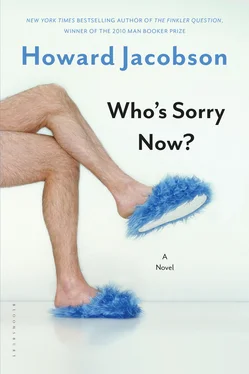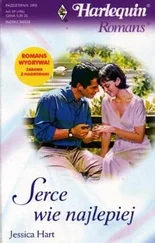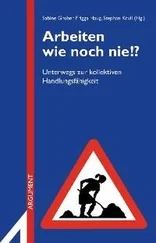Charlie mentally prepared himself for visitors, but no visitors ever came. As for inviting his own people, he remained squeamish about that on account of Chas. A tact thing. But perhaps he was nervous on his own account as well, not knowing what they would make of him looking so well.
He kept contact with those of the Richmond Kultur to whom he’d been closest. Phone calls mainly; inconsequential conversations which skidded away from anything dangerous; chit-chat of a literary complaining sort, stuff in the papers, gossip about what was happening in the television soaps, which Charlie and his set watched religiously, as an affront to those who inhabited a sniffier Kultur than they did. He did a pub lunch once with Clarence Odger, the friend who carried five hundred thousand words of manuscript with him everywhere in two plastic Waitrose bags, but that didn’t work out too well. In the first place the friend couldn’t concentrate on anything Charlie was saying to him because he couldn’t take his eyes off his plastic bags, and in the second, when he did remember his manners long enough to ask Charlie how his new life was going, there seemed to be some gleam in his eye which, in Charlie’s view, denoted salacious knowledge. Was that how his friends thought about him now — salaciously? Was that in some way how he thought about himself?
Thereafter he made no further arrangements to see anybody.
‘So, apart from me, did Marvin have no friends?’ he asked Hazel one evening.
Hazel opened her eyes wide at him. ‘You know what Marvin had.’
‘And when you were together …?’
‘Which wasn’t often.’
‘No, but when … what did you do?’
Hazel shrugged. What did they do? Had she forgotten already? Had nothing happened?
‘Meals,’ she said. ‘I recall a lot of meals.’
‘In or out?’
‘Oh, out. My husband loved being out.’
‘So what did you do when you were in?’
Knowing Charlie liked looking at the arch of her throat, Hazel threw back her head. ‘ In ?’ she repeated ‘Now there I think you’ve finally got me.’
‘You didn’t read to each other?’
Hazel laughed a bitter laugh. ‘Marvin spat chips, Charlie. You were his friend, you know that. He spat chips in front of the television, he spat chips when we went to see a film or a play, and he spat chips when he opened a book. Where would have been the fun of reading together? I needed to hear him spit even more chips? I once suggested he pick up his old academic ambitions and write a book of his own. Call it Spitting Chips . But you can imagine his reaction to that. He spat chips. Nothing he hated more than gerundival tides.’
‘Don’t I remember it,’ Charlie said. ‘Don’t I remember the scorn he poured on our Flying Away series.’
‘He would have,’ Hazel said, blinking. She was inclined to forget that Charlie had once been a writer of fictional self-improvement books for young adults. Flying Away must have driven her husband bananas. ‘Ing me no ings, he used to say. It should go on his tombstone. Ing me no ings. Cute fucker!’
So Charlie read to Hazel.
‘I can’t tell you where I am,’ Chas said, returning Dotty’s far too early Sunday phone call, ‘because I don’t know where I am. But I’ll give you a clue — I got here by rope ladder.’
‘Christ, Charlie, are you abroad?’
‘In a manner of speaking. Though in fact I’m on Clapham High Street … I think.’
‘You think?’
‘Well, I’m brought here, like some empress on a palanquin, only it’s not a palanquin it’s a Smart.’
‘It sounds as though you’ve been kidnapped.’
‘It feels a little as though I’ve been kidnapped.’
‘Sounds like you’re having fun, though.’
She thought about it. Was she having fun? ‘Yes,’ she said, ‘I’m having fun.’
‘And you’ll remember to be careful?’
‘On the ladder?’
‘No, not on the ladder. On the you-know-what.’
Chas laughed. ‘I’m damned if I know what the you-know-what is,’ she said, ‘unless you’re meaning to be crudely graphic. But no, as a matter of fact I have no intention of remembering to be careful.’
Then, because Kreitman was shinning up with a pot of coffee, she rang off.
He liked seeing her up there, high among his books, angular like the girders, a great creature, the biggest of the non-flying birds, nesting in his aviary. With her mobile phone to her ear.
‘There’s no good reason, is there,’ he said, blowing hard, ‘so long as you’ve got your phone to keep you nominally connected to the world, there’s no good reason why you shouldn’t stay up here for ever.’
‘Until you get bored.’
‘I won’t get bored.’
‘Until my children need me.’
‘Have them round.’
‘Oh yes. I can see that. They didn’t like you very much, Marvin, when you weren’t charvering their mummy.’
Kreitman shrugged. He was only trying to meet her objections. ‘Then don’t have them round. Just phone them occasionally and visit them a lot.’
‘And my work?’
‘You can dictate. I’ll be your stenographer. You might find the child in me.’
‘Marvin, I think it’s the man in you we need to locate.’
That’s how far advanced they were. They could insult each other and not expect to be misunderstood. Half the art of falling in love — attaining the foolish intimacy of schoolchildren.
Then her phone rang again. And then it rang three or four times after that. Dotty for a second time, warning against silliness. She knew her sister would like that. The other calls were from those of Chas’s friends who were also members of her profession. ‘Sunday morning,’ she told Kreitman between conversations, pulling a contrite face, ‘the Sunday-morning ringaround. You’ll have to learn to live with this if you want me never to leave your bed. On Sunday morning I catch up with the general rejoicing.’
To Kreitman’s sensitised ears — greedy for tidings from the Kultur — rejoicing wasn’t quite the word for it. ‘You’re joking!’ he heard Chas say. ‘You’re kidding me! She didn’t! The Smarties? I’d have given her more chance of winning the Peace Prize …’
Sometimes she set her mouth, compressing her lips to a bloodless scar, zipped tight across her face. Sometimes she tapped irritably at her temples, as though to loosen congealed matter. Sometimes, in a bound, she went from hilarity to despair.
‘What is it?’ Kreitman asked when she was done. ‘What have you heard?’
She sat with her knees up on his bed of rugs and tapped the space next to her. Lie here, my love.
She was confident of him. Confidently possessive of him, even on his territory. Lie here, my love — and he did.
Then she told him the terrible truth, that even writers of children’s stories felt bad about one another’s success, begrudged each other every penny, resented every word of praise bestowed on someone else.
‘I’d never have guessed it,’ Kreitman said.
She made as if to push him from the bed. ‘You needn’t be sarcastic. I’m just trying to be frank with you. I know how much you idealise my profession. So I think it’s time you heard it from my lips. I am not pleased for X. I cannot ever be pleased for X. I count every tick on her page a cross on mine.’
Tell me about it, Kreitman thought. Tell me something I don’t already know. As with letters, so with love. Every tick on his page, a cross on mine.
He smiled up at her and stroked her arm. Lolloping arms, he had once thought them. Mere farmyard implements. Now, transfigured by desire, they were a warrior maiden’s arms, long and tapering and strong, beautiful, victorious, the arms of Boadicea.
Читать дальше












